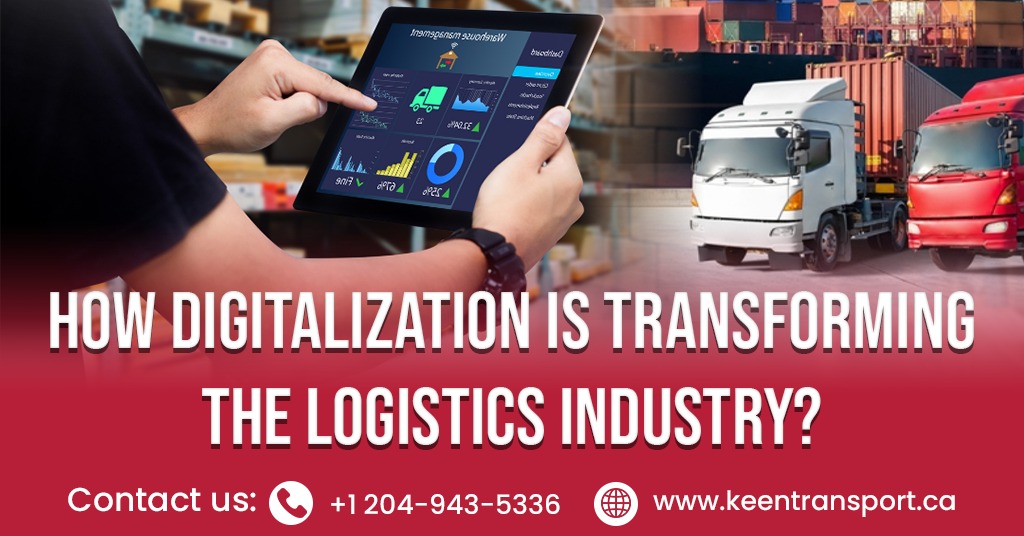The logistics industry has always been the backbone of the global economy, ensuring the seamless movement of goods and services across borders. However, the advent of digital technologies is rapidly transforming the way logistics companies operate. From enhanced efficiency to improved customer experiences, digitalization is reshaping the logistics landscape and paving the way for unprecedented growth opportunities. This transformation is evident in various sectors, including logistics companies in Winnipeg, trucking companies, and supply chain management services.
The Role of Digitalization in Logistics
Digitalization refers to integrating digital technologies into business operations to improve efficiency and productivity. In the logistics sector, it enables businesses to streamline processes, reduce costs, and deliver exceptional services. Companies, especially those in Winnipeg and beyond, leverage digital tools to remain competitive in an industry that demands speed, accuracy, and reliability.
Key Benefits of Digitalization in Logistics:
- Enhanced visibility and tracking of shipments
- Real-time data for improved decision-making
- Reduced operational costs through automation
- Better collaboration across supply chain stakeholders
Enhanced Supply Chain Management
Digitalization is at the heart of modern supply chain management solutions. Advanced software platforms allow companies to monitor their entire supply chain in real-time, identifying inefficiencies and implementing corrective measures promptly.
For instance, logistics companies in Winnipeg are adopting technologies like IoT (Internet of Things) and AI (Artificial Intelligence) to optimize their operations. These tools provide insights into inventory levels, transportation routes, and delivery timelines.
Case in Point:
A top trucking company offering full truckload services can use digital tracking systems to monitor fleet movements, ensuring timely deliveries and reducing fuel consumption.
Intermodal Transportation Services
Intermodal transportation services combine multiple modes of transport—such as trucks, trains, and ships—to move goods efficiently. Digital tools have revolutionized this process by enabling seamless coordination between various transportation modes.
Key Innovations in Intermodal Services:
- Real-time tracking of cargo
- Automated scheduling systems
- Predictive analytics for route optimization
Companies that provide intermodal services in Winnipeg are capitalizing on these advancements to offer reliable and cost-effective transportation solutions.
Automation and Robotics in Warehousing
Warehouses play a critical role in the logistics industry. With the rise of e-commerce, the demand for faster order fulfillment has skyrocketed. Digitalization has introduced automation and robotics, which are transforming traditional warehousing operations.
For instance, a warehouse in Winnipeg equipped with automated systems can handle inventory management, picking, and packing with minimal human intervention. This not only speeds up operations but also minimizes errors.
Advantages of Warehouse Automation:
- Faster order processing
- Reduced labor costs
- Enhanced accuracy in inventory management
The Shift Toward Smart Transportation
Transportation is a core logistics component, and digitalization drives significant changes in this area. Companies now use GPS tracking, route optimization software, and telematics to improve efficiency and reduce costs.
Applications in Trucking Companies:
- Flatbed trucking services leverage digital platforms to coordinate oversized cargo shipments.
- Heated vans equipped with temperature-monitoring systems ensure that perishable goods reach their destination in optimal condition.
- Grain transportation has become more reliable with real-time tracking systems, ensuring timely delivery during harvest seasons.
Logistics trucking and transportation companies in Winnipeg are leading the charge in adopting these technologies, enhancing both speed and reliability.
Embracing Data Analytics
Big data analytics is revolutionizing decision-making in the logistics industry. By analyzing vast amounts of data, logistics companies can predict demand, optimize routes, and improve service quality.
Impact on Transportation and Logistics Services:
- LTL (Less Than Load) shipments benefit from dynamic pricing models based on demand forecasts.
- Cross-docking services are optimized to reduce storage time and costs.
- Predictive maintenance for fleets minimizes downtime and extends vehicle lifespan.
Companies offering transport and logistics services in Winnipeg are increasingly relying on data analytics to stay competitive.
Customer-Centric Innovations
Digitalization has also improved the customer experience in logistics. From real-time shipment tracking to personalized delivery options, customers now have more control over their orders.
Technological Advancements for Customer Satisfaction:
- Mobile apps for tracking shipments
- Automated notifications for delivery updates
- Chatbots for instant customer support
These innovations have allowed logistics companies to build stronger relationships with their clients, driving customer loyalty and repeat business.
Challenges and the Road Ahead
While digitalization offers numerous benefits, it also comes with challenges. Cybersecurity threats, high implementation costs, and resistance to change are common barriers. However, the potential rewards far outweigh these challenges.
As more trucking companies in Winnipeg and beyond embrace digital transformation, the logistics industry will continue to evolve. Collaboration between stakeholders, investment in new technologies, and a focus on sustainability will be critical for long-term success.
Conclusion
The digital revolution is reshaping the logistics industry, offering unparalleled opportunities for growth and innovation. From enhanced supply chain management to customer-centric services, digitalization is enabling logistics companies to operate more efficiently and sustainably.
For businesses in Winnipeg, embracing this transformation is no longer optional—it is essential. Whether you’re a trucking company near me or a provider of cargo shipping services, leveraging digital tools can position your business as a leader in the modern logistics landscape.
By staying ahead of the curve, logistics and transportation companies can continue to deliver value to their clients while navigating the challenges of a rapidly changing industry.

